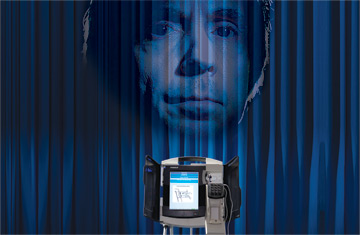
Despite a spotty past, Internet activist Brett Kimberlin has played a central role in the debate over electronic voting.
(4 of 4)
But when Rubin heard a touchscreen machine might be available, he flew to the activist's house and examined it. Too busy to take on the project himself, he passed the machines along to Ed Felten, a professor of computer science at Princeton.
Felten and two graduate students produced a damning report. First, they showed that a touchscreen machine could be broken into and tampered with using a commonly available key, an act that would probably draw the attention of poll workers in an actual election. They also showed how a virus introduced from a memory card could steal votes. Felten concluded that touchscreen voting machines "are much more vulnerable to large-scale fraud" than older voting methods and that paper trails are needed to lessen the problem. Diebold spokesman David Bear says Felten's tests aren't "reflective of what happens in a real environment" and are "analogous to a magic trick, where you control the stage."
KIMBERLIN IS ONE OF THOSE people who indulge in late-night e-mails. "You have to explain what makes me different," he wrote in a message sent to me at 2:36 a.m. last month. "Not only did I have to overcome my past, but I then had to rise above millions of others to accomplish what I have. That is what makes this story special." In fact, it is not Kimberlin but his habitat that is special. In the anonymous universe of the blogosphere, Kimberlin could recruit like-minded activists, build a network to exchange information and leverage it all for access to credible opinion makers in academia and government.
A government report put out last December by the National Institute for Standards and Technology gave an apparent nod to the Princeton report, asserting in its conclusion, "We need voting systems that the computer engineering and security community can accept as reliable and secure." The panel endorsed the idea contained in Holt's bill of adding a paper trail to e-voting machines to keep the touchscreen's ease of use while providing printed receipts in the case of a recount. Pelosi's spokesman Brendan Daly says the prospects for Holt's bill in the spring "look good."
That will be too late for the voters in Florida's 13th District. Pelosi has said she intends to seat Buchanan, pending the outcome of Jennings' court case. That may be the right thing to do, but with no independent record of last November's vote, the Americans living in that district may never know who rightfully won the election. This might not seem like a big deal, but legitimacy is the musculature of democracy; without it, government has all the credibility of, say, Brett Kimberlin.
